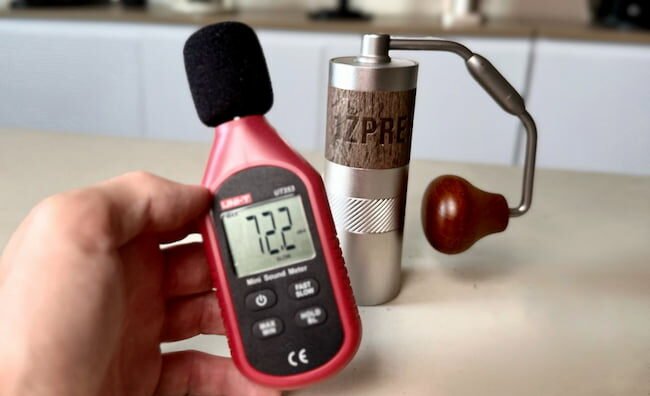Most people who love coffee also tend to love sleeping.
Grinding coffee is noisy, and noise is the antithesis of sleep.
Fortunately, there are grinders running at a nearly silent level, so you won’t wake up your family or partner when preparing your morning brew.
To help you out, I took out my decibel-meter and measured a bunch of grinders in my collection.
I got good news for you: Some grinders are indeed very quiet! However, there’s also some bad news. I’ll explain what and why in the next section.
About the test:
I used a professional decibel-meter to measure the grinders. I held the decibel meter 20 centimeter from each grinder and tested them by using the “slow & max” functions. This way the grinder will show the highest maximum dB for a certain grinder.
How To Choose a Quiet Coffee Grinder
If you’re looking for a silent coffee grinder, it’s likely because you don’t want to wake up your entire household. If that’s the case, then I completely understand!
The reality is that most coffee grinders are quite noisy devices. With either conical or flat burrs spinning at RPMs of up to 1400, noise is inevitable.
Even if a grinder features an almost silent motor, there will still be some noise when beans enter the burr chamber. In my collection, some grinders have exceptionally quiet motors; notably, models with brushless motors stand out in this aspect. However, even some grinders with regular motors, like the Eureka Mignon series, operate quite silently when unloaded.
What I quickly discovered in my tests is that to significantly reduce noise, you need a grinder that spins extremely slowly. One category of grinders excels in this criterion: manual coffee grinders.
Since manual grinders dont have a motor, but are instead operated by your biceps, the motor noise is nonexistent.
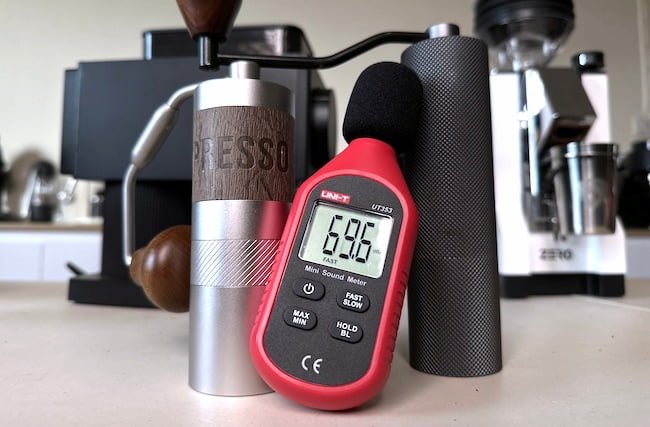
Noise also increases the faster the burrs are spinning. But manual grinders operate in the 60 “rotations per minute” range, which is just around one rotation per second.
Contrast that to electrical grinders where the burr spins up to 23 times per second. Obviously, that’s going to be way more noisy!
So yes, manual grinders are the way to go if you want a silent grinder.
To be honest; most of manual grinders are around the same noise level. If you want a basic one that is fast and good value for the money, then I suggest the Timemore C2.
However, if you want to upgrade a bit when it comes to flavor, functionality and UX, then I have some other options for you. You should take a look at this post for some cool manual grinders.
What about electric grinders?
With electric grinders the results were more mixed. Yes, some were actually impresively silent when running empty. However, even the most exemplary ones tended to make substantially more noise when loaded. And since coffee grinders tend to be loaded a lot of the time when they are used, it makes sense to focus on the most noisy aspect of the grinding.
I’d say even the most quiet electric ones still make some level of noise, which is also backed up by the levels of dB measured.
I also noticed a couple of other things from testing grinders with the decibel meter:
- Sometimes grinders were louder than expected when measured, but the pitch was pleasing, so the end result was less jarring.
- I thought the noise level would also depend on the roast degree and the coarseness on the grounds. For example, a dark roast on espresso setting might be more quiet than a light roast on a coarse grind setting. But in my testing with the decibel-meter there was no big surprise here.
Test results
- 72-74 dB (The typical manual grinder): This level is akin to background city traffic or a running shower—noticeable, yet not overwhelmingly loud. In a typical home environment, a coffee grinder at this decibel level would be audible but should not disrupt daily activities. It may blend into the background during busy morning routines, making it a manageable option for those who appreciate freshly ground coffee without causing significant disturbance.
- 80 dB (The most quiet electric grinders): Comparable to the noise from a busy restaurant or an alarm clock, this level is more pronounced and can be clearly heard above normal ambient sounds. While it may momentarily draw attention, it’s still within a range that many might find tolerable for short durations.
(I tested DF64V and DF83V with Sweet Lab burrs to fall in the range around 85 dB. I’d say those grinders are a good benchmark for “tolerable” where everything under is considered “quiet”). - 90 dB (More noisy electric grinders): At this intensity, the sound is similar to that of a lawn mower or a subway, marking it as distinctly loud and potentially disruptive if used in a small, enclosed space. However, considering the relatively short duration of grinding coffee, this level of noise may be acceptable, especially if the grinder delivers superior performance.
My favorite Silent grinders
1Zpresso Q2
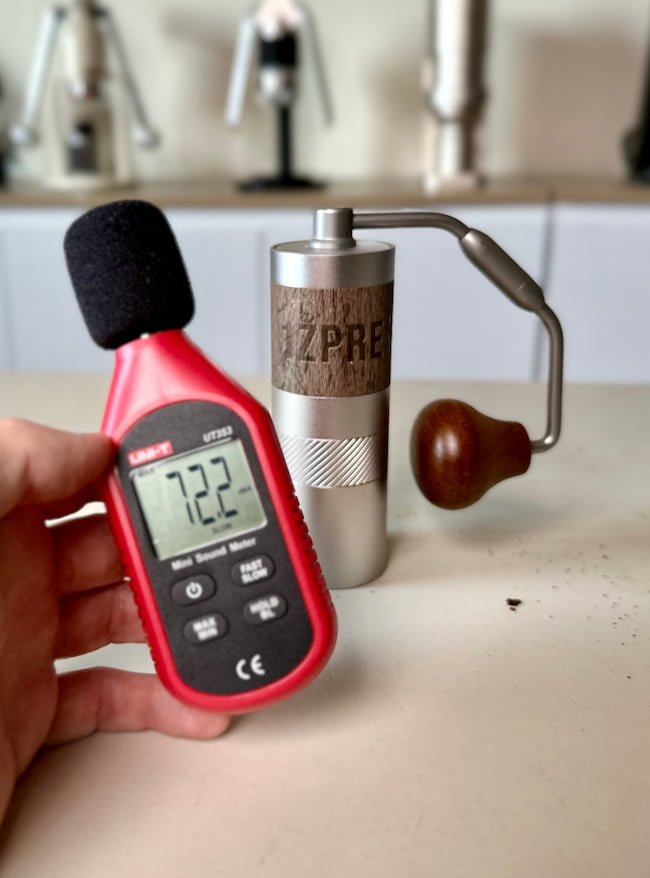
1Zpresso Q2 is a manual coffee grinder, so that means it’s by default a quiet coffee grinders.
It’s a small and travel friendly grinder that shouldn’t wake up even the lightest sleeper if you use it in the room next door.
The Q2 is an outstanding hand grinder that will give you a pleasing cup profile. It comes with a new burr set compared to previous iterations; the so-called heptagonal burr set. This set works for espresso and produces a cup profile with sweetnes and clarity.
While the grinder was in the same decibel range as the other manual grinders, I tested it was just smidge more silent. I think that is due to the smaller burr size and shorter handle. It requires less torque and hence creates a bit less noise.
Check out the full review.
1zpresso amazonFellow Ode Brew Grinder
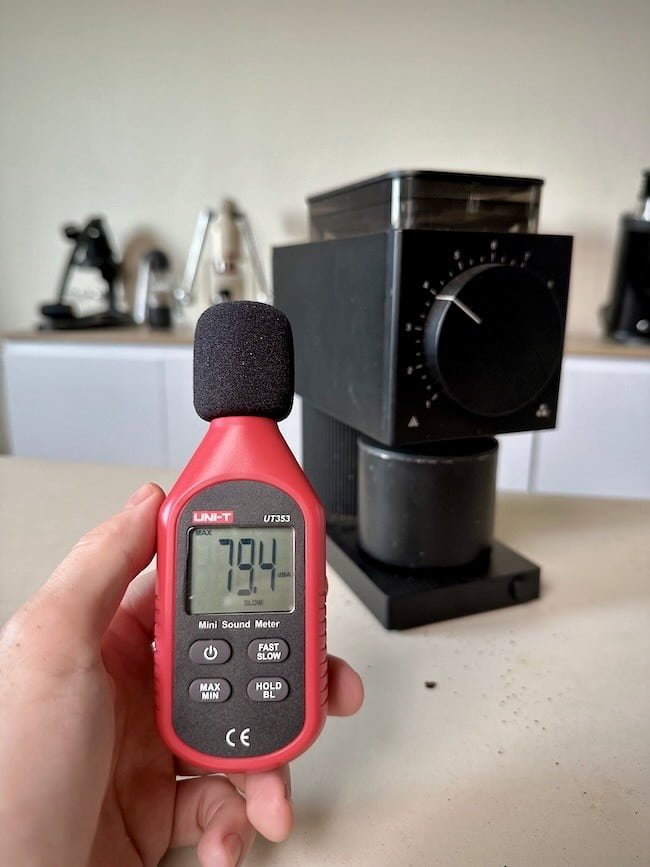
If you don’t like having to grind your coffee beans manually, then Fellow Ode’s Brew Grinder might be the perfect solution for you.
I measured the Fellow Ode to 79.4 decibel from a 20 centimeter distance when grinding on a medium setting. That is significantly better than many other grinders. It’s also a very fast grinder with a pleasant pitch, so it’s unlikely to disturb you unless you’re very sensitive.
This is a flat burr grinder, which is good, as it usually offers better consistency and, overall, a more flavorful cup. I really like the new Ode Gen 2 burrs that have been implemented in the grinder a few years ago.
The Fellow Ode looks minimalist and modern, and it’s easy to clean as well. It’s one of the calmer options available on the market.
You can adjust how fine you want the ground coffee to be, but the grinder will not be able to do espresso.
It’s possible to install 64 mm espresso burrs, in the Ode, but keep in mind that it might become more noisy when you change burrs.
The Fellow Ode Brew Grinder is a great option for those who want silent and good-looking grinder.
Check out my full review here
fellow amazonEureka Mignon zero
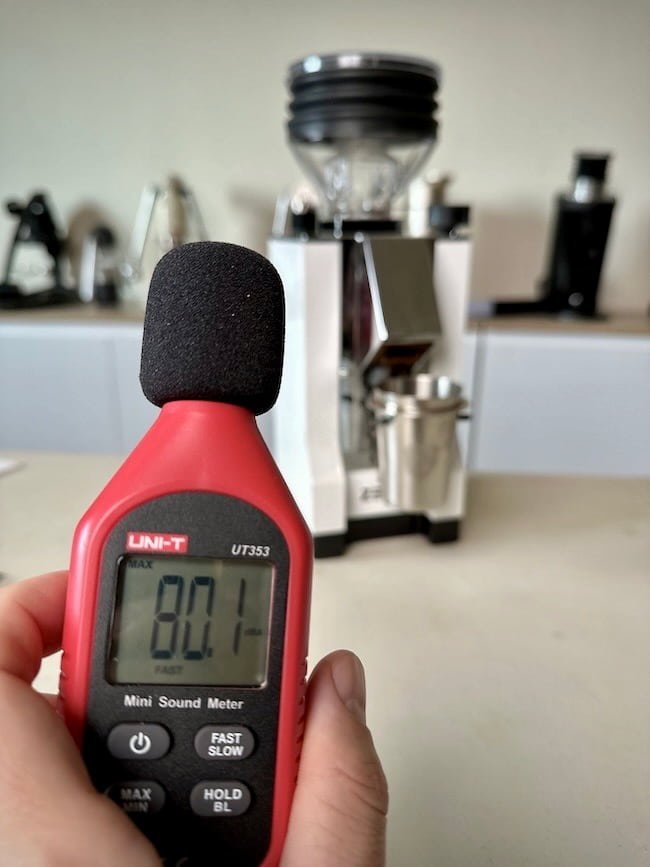
All the grinders in the Eureka Mignon series are relatively nice sounding, but a few stand out even more since they have built-in “silence technology.” This goes for the Mignon Zero and the Mignon Specialita, which I have previously reviewed.
The motor and the grinding chamber use special technology to dampen sound extremely well.
This is unique: Coffee grinders are usually noisy, especially espresso grinders, since they need to run at a high RPM and rely on aggressive burrs.
I was a little bit surprised to see this grinder score high than the Fellow Ode on the dB-meter, but the sound was actually not bothersome at all. Even though it’s tempting to reduce noise to a dB-number, it usually also has a lot to do with the pitch of the device. And Eureka’s grinders in the Mignon-range have a really nice low-frequency buzz.
This is the grinder if you want to brew espresso without waking up the whole house!
amazon Seattle coffee gearNoisy grinders to avoid
If noise is the main concern, there are a few grinders that I would warn against.
The Baratza Sette is the first grinder that comes to mind. It’s a great grinder in many aspects, but the noise level is not one of them. It’s loud as a jackhammer and will most likely wake up the whole house. Avoid at all costs. In general, most of Baratza’s grinders are rather noisy since almost all use a lot of plastic in their construction. This doesn’t work to dampen sound very well.
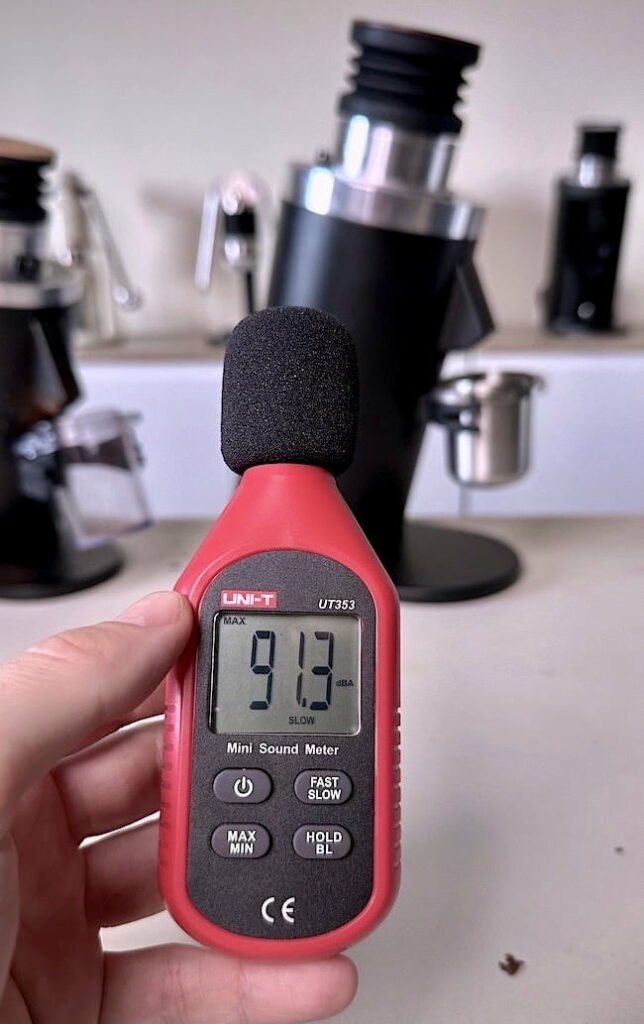
The DF64 is the second grinder that comes to mind. The grinder is not that bad when you use it with stock burrs. But many people equip this grinder with SSP Multipurpose burr, which turns it into a cacophony of noise and screeches.
I did test the DF64 Gen 2 with the dB-meter and the score was quite a bit higher than the other electrical grinders in this article. So yes. I’d probably avoid that one, even thought it’s a phenomenal grinder.
GENERAL FEATURES
As mentioned before, you should consider many other things when shopping for a quiet coffee grinder.
- Brewing method: What brewing method will you be mainly using? Espresso requires a special grinder, whereas pour over-focused grinders should be optimized for this brewing.
- Single dosing: Is that something you value in a grinder? It’s been one of the hottest trends lately, but these grinders tend to be more noisy because they have less “stuff” to insulate the burr chamber.
- Flat burrs or conicals: Flat burrs, besides being more consistent, are sometimes quieter when it comes to electric grinders. However, there are exceptions to the rules here and much will depend on the geometry of the specific burr model. Flat burr grinders are usually also more expensive.
